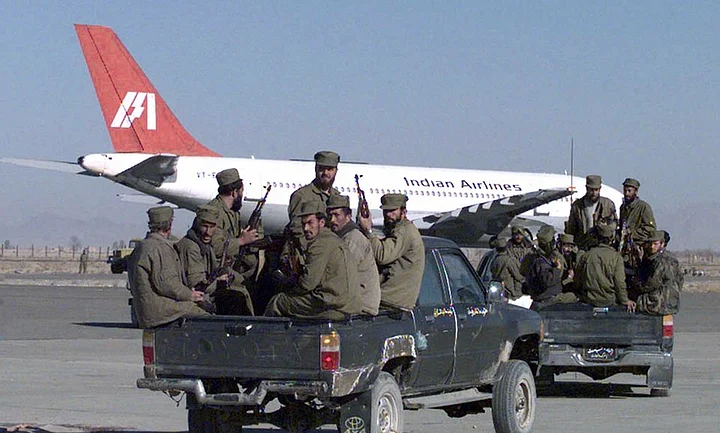“So was ransom money paid?” I asked the bespectacled man lounging in his large living room sofa in sea green shorts and blue striped T, his thin left arm on the sofa’s crest, legs crossed casually.
Amarjit Singh Dulat, author of Kashmir: The Vajpayee Years, which has created a maelstrom in the intelligence community and in Kashmir, shot a glance at me and then smiled sheepishly. The toothy smile broke into a roaring laugh as he struggled to deny that the Indian authorities paid the hijackers of IC-814 money besides releasing three terrorists in exchange for the freedom of 160 passengers on December 31, 1999, in Afghanistan’s Kandahar airport.
“I am told a great deal of money was paid,” I said. “No, no, no. No money was paid,” Dulat said, shaking his head as he continued laughing. He called for an orderly amidst phone calls from friends and admirers. One caller suggested he give an interview to Pakistan Television (PTV). “I am open to an interview but I don’t want to be a part of a discussion on the ISI and RAW,” Dulat said, laying down his condition.
Once through with the phone call he turned to the waiting orderly and instructed, “Coffee lao inke liye, aur mere liye kahwah”. “So how is the book doing?” he asked me. “It certainly has created a buzz in your former organisation (Research and Analysis Wing, which he headed for a year between 1999 and 2000),” I told him. “It certainly will make many in Kashmir feel bitter,” Dulat said.
Ransom Demand
“But you have mentioned in your book that the hijackers demanded $200 million in cash,” I reminded him. “Did I? Where? Show me,” Dulat said as I flipped through the pages of his book – stopping at page 39. “After the plane reached Kandahar… we heard of the hijackers’ demands: the release of 35 terrorists from Indian prisons, the main one being Maulana Masood Azhar, a dreaded veteran terrorist leader; and $200 million in cash.”
He furrowed his brows to read through his gold-rimmed bi-focals. Jerking his head up once, he chuckled and continued to deny that poor Jaswant Singh, the then External Affairs Minister, carried some part of the ransom money, along with Masood Azhar, Mushtaq Ahmed Zargar and Omar Sheikh, on the special plane to Kandahar.
“Arre no money was paid,” he insisted, failing to suppress his laugh as he dismissed my suggestion with a wave of his gangly left arm. What Dulat did admit, however, was that the initial demand of the hijackers was the release of 105 terrorists. “Which was then brought down (by a team of negotiators led by then IB Special Director Ajit Doval and his immediate subordinate Nehchal Singh Sandhu) to 35, 15 and finally three,” Dulat said.
‘We Could do Nothing’
“There was nothing we could do. We had to agree to the demands because the lives of 160 people were at stake. If we missed an opportunity to prevent the plane from leaving Indian airspace, it was at Amritsar,” Dulat said, looking out the large glass-paned windows of the living room of his Friends Colony (East) bungalow.
Drifting back in time, Dulat said the hijack took every member of the Crisis Management Group by surprise. “They were shell-shocked. But by Day 2 of the hijack the political leadership knew some concessions had to be made,” he said, admitting that there was “total confusion” among CMG members.
“The atmosphere was tense as the bargaining with the hijackers began. For the most part, L K Advani did not utter a word. Jaswant Singh was perhaps the loneliest person because he could not get the West to react as it was Christmas time in that part of the world. And in any case relations with Pakistan were at its nadir,” Dulat recalled. “It is because he felt so lonely that he resigned himself to accompanying the terrorists,” the former RAW chief said.
Dulat explained that the main purpose of his book was to tell decision-makers in the security and political establishment “to get rid of the cobwebs in their minds.” “I respected the former ISI chief Asad Durrani. We have met for Track Two diplomacy. And there is no reason why we should not reach out and speak with the Taliban,” Dulat said.
